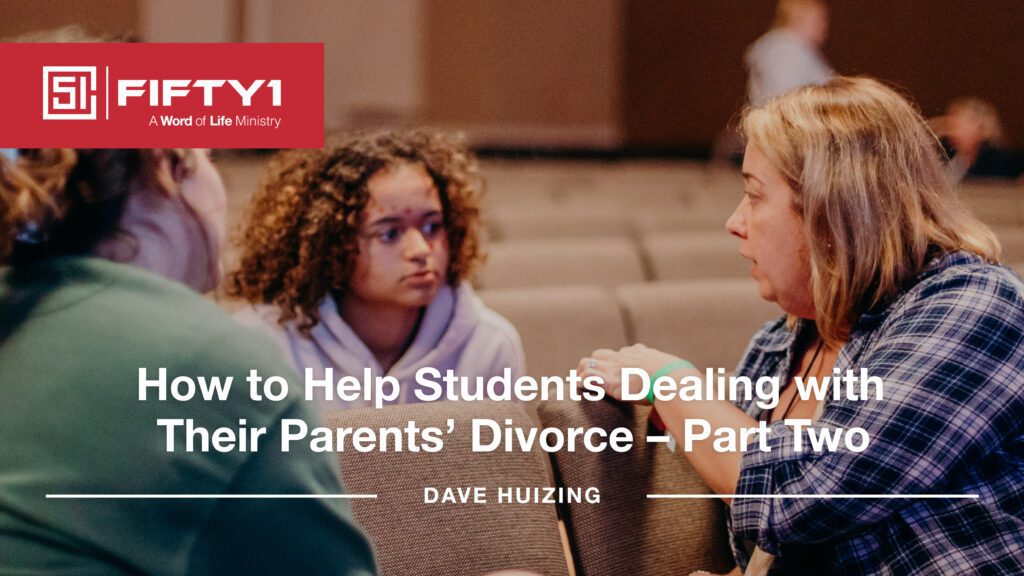The goal in my previous post was to help you understand the level of trauma children and teenagers experience when their parents choose to divorce. In this post, my goal is to give you some practical ways to minister caring, compassionate help to their hurting hearts.
If you’re like most youth leaders, you probably thought the most trauma you’d ever have to face in your ministry would be a twisted ankle from a game of football or a broken bone at summer camp. If you’ve been a leader for any length of time, you know that youth ministry is much messier than that!
The truth is that the children and students in your ministry come from broken homes comprised of spiritually broken, sinful people in need of God’s redemptive grace. This is, however, not limited to only “unsaved” families. Even “Christian” families can be divided if everyone’s aim in life is not set on pleasing the Lord (2 Corinthians 5:9-10), disregarding the commands the Apostle Paul gave us in Philippians 2:1-8.
Ministering to a child experiencing the trauma of divorce (or any challenging situation) isn’t about relying solely on your wisdom or speaking skills. It’s about leaning on the Holy Spirit to impart His wisdom through His Word to these precious young souls. If you feel unprepared for such a task, be encouraged that God often uses the unlikeliest people for His glory, as 2 Corinthians 4:7 reminds us: ‘But we have this treasure in jars of clay, to show that the surpassing power belongs to God and not to us.’
As mentioned in my last post, there are a variety of ways in which children navigating a divorce will react, so it’s important that you’re prepared to help the child process their responses in a way that guides them to glorify and please God even in adversity.
Learning how to harness your emotions is one of the most difficult parts of growing up. Imagine how much more complicated this skill becomes when the two most trusted people in your life are at odds! In such situations of continual conflict, children often feel bewildered, lost, and distrustful. As they grapple with their feelings, their reactions might vary. Below are some possible responses and how you might approach them:
1. They may seek out a neutral, trusted person (like you!) for help
First, be thankful for this opportunity. Then, allow them space to express themselves verbally. Resist the urge to offer advice too soon. They need to be heard more than they need a quick-fix Bible verse. Remember Job’s friends in Job 2:11-13? Their initial silent support was commendable, unlike their later misguided counsel.
2. They may lash out in random, unprovoked anger
Here, it’s key to guide them away from sinful anger (Proverbs 25:28; Eph. 4:26-27). James 1:19-21 teaches us that such anger never results in God’s righteousness. Encourage them to let go of their anger, regardless of their feelings.
3. They may withdraw and isolate themselves from others.
This behavior might indicate depression. Approach them with gentleness (Galatians 6:1-2). They might be reluctant to face-to-face interaction, so starting with texts could be effective. Avoid overwhelming them with numerous Bible verses; instead, show your care and consistent presence (Romans 12:15), and let them know you’re praying for them.
4. They may feel they have been abandoned by one or both of their parents.
It’s natural for children, who are often driven by emotion, to feel abandoned. As followers of Christ, we must anchor ourselves in the truth of God’s Word. Remind them that, although a parent may have left, God never will (Psalm 27:10; Hebrews 13:5). These verses can offer comfort and reassurance of His unending presence.
In all your interactions, continuously point them to Jesus and His all-sufficient Word. While Scripture doesn’t directly address children’s responses to divorce, its principles are clear.
I realize this only scratches the surface of a complex topic, but I hope it sparks ideas on offering biblical hope and support to your students.
Finally, I recommend ‘Caring for the Souls of Children,’ edited by Amy Baker, particularly the chapter ‘Counseling Children of Divorce.’ Another helpful resource is Kelli Dionne’s children’s book, ‘James and His Weird Mad—Biblical Help for Children of Divorce.’
For further assistance, feel free to contact me at dhuizing@wol.org.
Dave Huizing has served as the Word of Life area missionary for Long Island, New York City, and northern New Jersey for 33 years. He and his wife, Kate, have been married for 43 years and have five adult children, three sons-in-law, a daughter-in-law, and six grandchildren.

